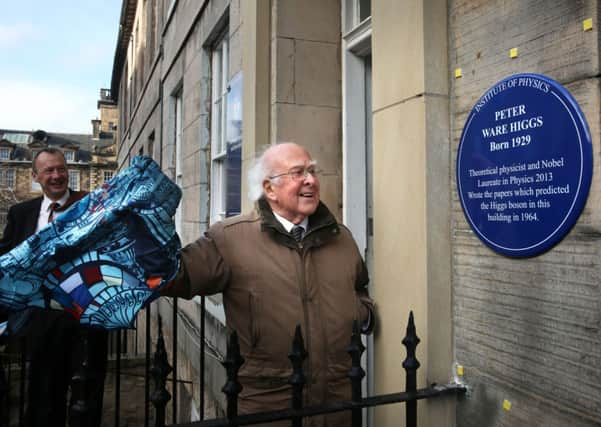Peter Higgs unveils Edinburgh plaque honouring work


The acclaimed theoretical physicist was a researcher at Edinburgh University in 1964 when he predicted a sub-atomic particle, now known as the Higgs boson, which enables other particles to acquire mass.
A blue plaque was installed at 5 Roxburgh Street on Tuesday.
Advertisement
Hide AdAdvertisement
Hide AdIt notes that Prof Higgs “wrote the papers which predicted the Higgs boson in this building in 1964”.
His idea was borne out by experiments almost 50 years later, in 2012, at the European Organisation for Nuclear Research (Cern) in Switzerland, and he was awarded a Nobel Prize for Physics the following year aged 84 for his work.
Prof Higgs unveiled the plaque, sponsored by the Institute of Physics and the city council, following a ceremony at Edinburgh University at which he was awarded an honorary degree by the University of North Carolina (UNC) at Chapel Hill.
Prof Higgs spent a sabbatical year at the American university in 1965 during which he wrote an academic paper that would form the basis of experiments at Cern.
His honorary doctor of science degree was conferred by UNC chancellor Professor Carol L Folt for “outstanding accomplishment in the field of theoretical physics, especially his fundamental work on the origin of mass”.
The event was hosted by Edinburgh University vice-principal Professor Richard Kenway and attended by students from UNC who are currently studying in the Capital.
Prof Kenway, a former colleague of Prof Higgs, said: “It is truly historic to celebrate such a seminal theory in physics with its author, Peter Higgs, in the building where he first wrote it more than 50 years ago, and in the company of some of his colleagues from that time.”
Prof Folt said: “Nearly half a century ago, Professor Higgs found himself at the University of North Carolina at Chapel Hill conducting revolutionary work in physics and his work continues to inspire us.
Advertisement
Hide AdAdvertisement
Hide Ad“His research had a profound impact on the field of fundamental physics, and his example motivates our faculty and students to pursue their passions and make their own significant mark on their discipline.”